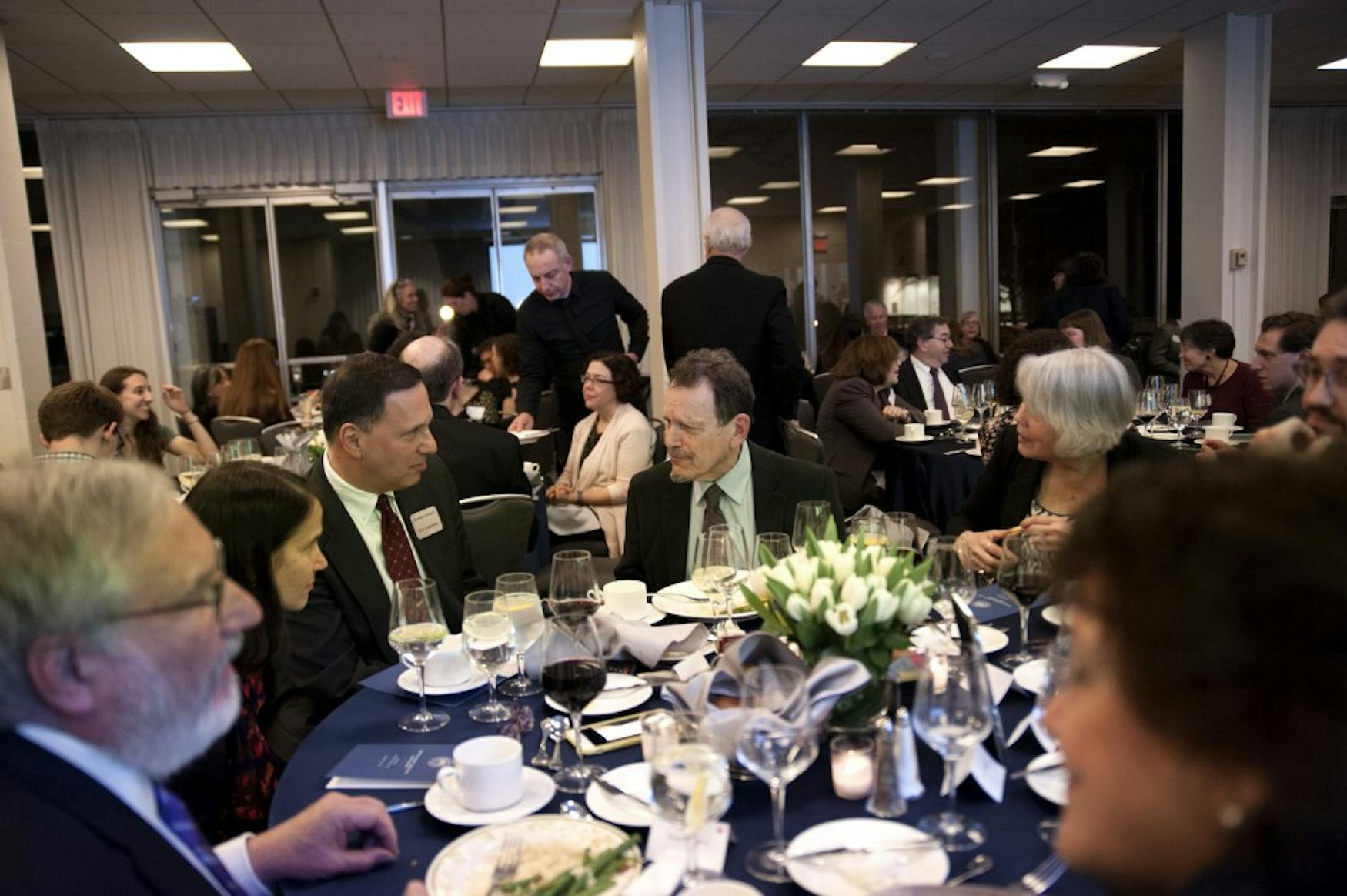Weller receives Creative Arts Award for career’s works
In his acceptance speech for the 2017 Creative Arts Award, Michael Weller ’65 expressed his gratitude and frustration in the wake of his controversial play, “Buyer Beware.” Weller, an Academy-Award nominated screenwriter and Brandeis alumnus, was announced as the recipient of the award last summer. Weller noted in his speech that he wrote the play to demonstrate his appreciation for the University.
The ceremony was held on Tuesday evening in the Main Dining Room of the Faculty Club, populated by more than a hundred professors, faculty members, alumni and student leaders. Prof. Gannit Ankori (FA), head of the Division of Creative Arts, kicked off the night with a short film which detailed Weller’s accolades and accomplishments through old interviews and photographs. Weller said in the film that his Brandeis college experience informed the composition of his first play, “Moonchildren.” He went on to write more than 40 other plays and screenplays. The film also provided context for the Creative Arts Award, which has been awarded to such distinguished individuals as Tennessee Williams, Georgia O’Keeffe, Mark Rothko, Vladimir Nabokov, Buckminster Fuller, John Cage, Ludwig Mies van der Rohe and Charlie Chaplin.
After the video, guests ate dinner and mingled. One member of the Lydian String Quartet discussed free speech on college campuses with alumni, former faculty and Justice reporters, themes that Weller would echo in his acceptance speech. After the meal, University President Ron Liebowitz presented Weller with the award, then gave a short speech apologizing for the controversy surrounding “Buyer Beware.” He emphasized the importance of discussing and learning from the production, instead of simply focusing on the “miscommunication and pain.”
The controversy in question began in 2016, when Brandeis invited Weller to study the Lenny Bruce archives and engage with students, faculty and administration as he completed his fellowship. He drew on this research to write a new play to be performed at Brandeis, tentatively titled “Buyer Beware.” The name is a reference to one of Bruce’s recordings. The play focused on a white college student named Roy who performs a comedy routine in the style of Lenny Bruce at his college, leading to threats from the administration and other students. Roy recites parts of the eponymous Bruce routine at the beginning of the play, including eight uses of the N-word and four uses of other slurs, as well as jokes about the Israel-Palestine conflict, while a crowd of students protests his performance.
In July 2017, a draft of the play was presented to the University’s Theater Arts Department, where it was scheduled to be performed in November 2017. Several students voiced opposition to the play, including Andrew Child ’19, an undergraduate departmental representative for the theater department, and alumna Ayelet Schrek ’17, who helped organize a phone and email campaign to draw attention to the play’s language use and portrayal of minorities.
After weeks of criticism, the University proposed postponing the production until spring 2018, when it would offer a course to discuss the controversial aspects of the play. Weller then withdrew his work because he felt the student and faculty response “might not be conducive to the creative atmosphere desired for a premiere presentation of a new work,” according to the University’s Nov. 6 statement on the controversy.
After Liebowitz’s speech, Weller thanked the University. He began his speech with humility, saying plainly, “This is a tricky moment for me.” Lenny Bruce was offensive, challenging and shook his audience to their core, he said. “I guess I did too, maybe a little too well.”
Weller described his struggle to accept the award in a way that “fit the occasion without making [his] nose grow longer.” Trying to compose his acceptance speech, he sought inspiration from the Lenny Bruce papers on display in Goldfarb Library, to no avail. Instead, Weller said with a wink and a smile, he encountered the ghost of Lenny Bruce.
Weller used their exchange to examine how attitudes toward controversial humor have changed in the last 70 years. He described how Bruce called people out for being “full of shit,” and observed, “People are still full of shit these days, but now they don’t want to know it.” He also wondered if students today are too isolated, commenting that when he grew up kids played “cowboys and Indians,” while “kids these days stay in their rooms playing Call of Duty and Destiny 2.”
Weller observed that despite Bruce’s controversial routines, he was an immensely influential comedian and public figure, arguing that his presence in the library archives should be a “testament to his quality.”
He described how Bruce’s ghost regretted letting the “virtue cops grind him down,” imploring Weller not to make the same mistake he did.
Just before the end of their exchange, the ghost wrote a statement on a piece of paper and instructed Weller not to read it until the ceremony, Weller said.
He had reservations, given the formality of the ceremony and Bruce’s history of inflammatory remarks, but he eventually agreed. In front of the administration, students and alumni, Weller produced a piece of white paper, unfolded it and read it aloud: “I’m honored. Thank you.”



Please note All comments are eligible for publication in The Justice.